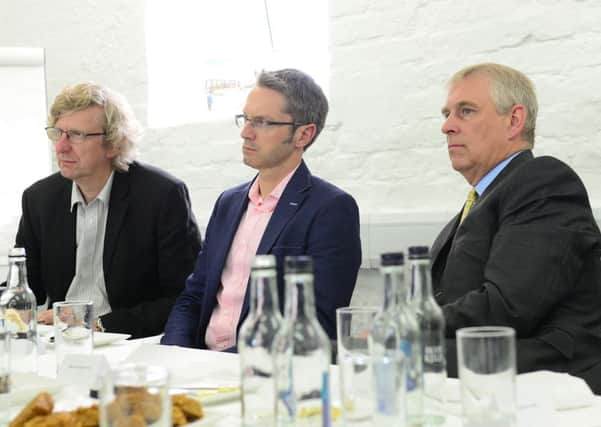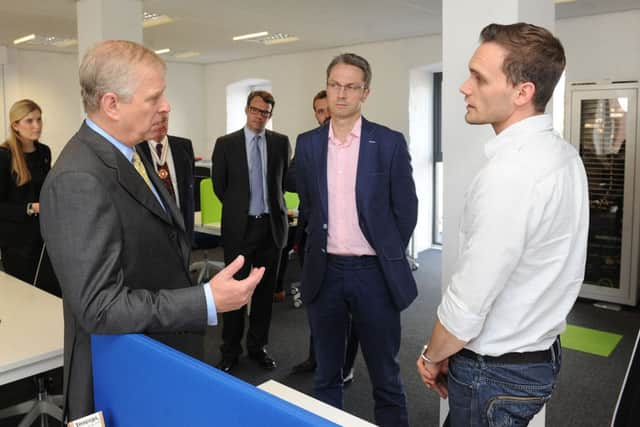Britain must adopt more enterprising culture, says Duke of York


Speaking during a visit to Yorkshire, Prince Andrew said the UK faces new geopolitical threats such as Middle East terror group Isis as well as rising global competition.
But the Duke said Britain still has a huge amount to offer to world markets and praised projects across the country for creating “local solutions for national problems” in nurturing entrepreneurial skills.
Advertisement
Hide AdAdvertisement
Hide AdHe visited the Centre for Digital Innovation in Hull, a 13-month-old co-working space for technology companies and met with young people who have started up new digital businesses.


The Duke said he was “really inspired” by what he saw and declared that “enterprise is alive and thriving and enabling the young to be dynamic and innovative”.
In a round table discussion hosted by The Yorkshire Post, he said Britain could become more entrepreneurial by encouraging an enterprising culture in the school system and allowing it to flourish.
The Duke said: “You can look at the education system and say the education system is for the sake of the education system but actually what we are trying to do is create useful young people who are going to be entrepreneurial, enterprising, good employees, potential employers in times to come and to encourage them to do that.
“Is the system doing that today? Questionable.”
Advertisement
Hide AdAdvertisement
Hide AdThe Duke praised schemes such as Rotherham Ready, a programme to bring businesses, schools, children and teachers together, and said the region’s universities have pulled together to support enterprise.
He described Yorkshire as a “very entrepreneurial” place.
The Duke added: “Yorkshire is probably as forward thinking as it ever has been.
“It knows where the industrial revolution started, it knows where it needs to go and to some extent Yorkshire has an advantage, it has an identity; it is big enough to be a region of its own.”
He said Britain will be less able to afford the things it has become accustomed to unless it embraces entrepreneurialism.
Advertisement
Hide AdAdvertisement
Hide AdThe Duke added: “We have the opportunity now of applying another industrial revolution, the digital revolution.
“We have the wherewithal to do it, but if we don’t grasp this we won’t be as prosperous as we would like to be.
“And our relative position, relative to other countries, will be diminished. To some extent, historically, we have been used to that since the days of the empire and have slowly withdrawn and become a small part of the European Union.
“I still think the UK has a huge amount to offer and that’s based on the level of inquiry I see from overseas.
Advertisement
Hide AdAdvertisement
Hide Ad“One of the other things we have got to recognise is there is a great deal more competition out there than there used to be.”
He has recently returned from Geneva, where he met representatives from the United Nations and World Trade Organisation.
The Duke said: “It is very interesting if you look at it from their perspective you can see how traditional decision-making cycles - Bretton Woods and various others - have all gone out of the window.
“You suddenly see threats on the horizon that you never could conceive of a year ago. Isis in what it is trying to do.
Advertisement
Hide AdAdvertisement
Hide Ad“Could we have understood what Mr Putin was going to be doing? Those that would have watched him would have said there’s potential for him to do something stupid somewhere else.
“But then once the US starts to decline it is taking the foot off the neck, it is allowing everybody else to do things. So there are all sorts of other geopolitical and strategic things that are facing us.
“Narrowing it right down here, the risks just in this area are there will be a lack of prosperity because we are going to miss the boat.
“I don’t see that happening. I see people making huge efforts around the country and local solutions to national problems.
Advertisement
Hide AdAdvertisement
Hide Ad“I see locations doing it their way, benchmarking across to colleagues in other parts of the country.”
The Duke said he is finding more and more partners to work with around the country on delivering and raising the profile of enterprise culture.
He highlighted the importance of young people gaining a skill as well as an education as “absolutely key in the 21st century” and said parents should consider new avenues for their children such as university technical colleges and studio schools.
Fruit Market is ‘Shoreditch of the future’
Jon Moss and business partner John Connolly launched the Centre for Digital Innovation in Hull last year.
Advertisement
Hide AdAdvertisement
Hide AdToday C4Di is home to nearly a dozen digital businesses and is at the heart of an area set for major regeneration led by Wykeland Group.
Mr Moss likened the Fruit Market area of Hull to Shoreditch 20 years ago, in a reference to the district of East London that is now home to some of the capital’s best tech companies as well as some eye-watering rents.
Mr Moss said: “There’s a huge trend at the moment that start-ups can’t afford to be a start-up in London so we are seeing that start-ups are moving out to other places in the UK and Hull should be considered as one of them.
“The Fruit Market area has a lot of soul, a lot of character and is going to be developed sympathetically to make an epicentre for everything going on in the creative, digital and arts world.
Advertisement
Hide AdAdvertisement
Hide Ad“With 2017 City of Culture coming and having the fastest internet in the country it is like the perfect storm for start-ups.”
Wykeland Group is investing between £8m-£9m to “pump prime” the area, said managing director Dominic Gibbons.